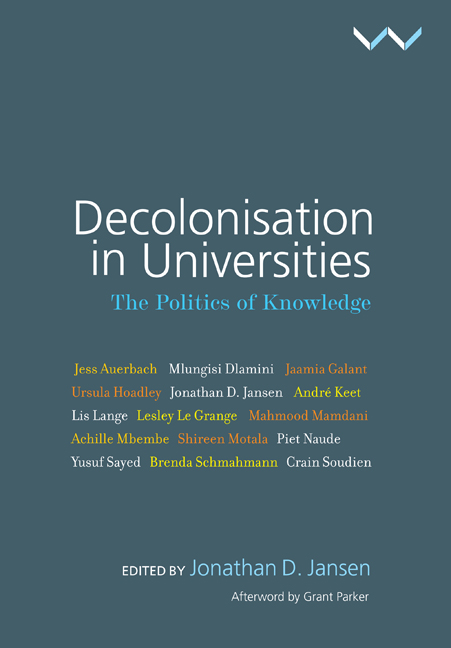Book contents
- Frontmatter
- Contents
- List of Figures
- Acronyms and Abbreviations
- Introduction and Overview: Making Sense of Decolonisation in Universities
- PART 1 THE ARGUMENTS FOR DECOLONISATION
- PART 2 THE POLITICS AND PROBLEMS OF DECOLONISATION
- PART 3 DOING DECOLONISATION
- Chapter 6 Scaling Decolonial Consciousness? The Re-Invention of ‘Africa’ in a Neoliberal University
- Chapter 7 Testing Transgressive Thinking: The ‘Learning Through Enlargement’ Initiative at UNISA
- Chapter 8 Between Higher and Basic Education in South Africa: What Does Decolonisation Mean for Teacher Education?
- PART 4 REIMAGING COLONIAL INHERITANCES
- Afterword: Decolonising Minds via Curricula?
- Contributors
- Index
Chapter 6 - Scaling Decolonial Consciousness? The Re-Invention of ‘Africa’ in a Neoliberal University
from PART 3 - DOING DECOLONISATION
Published online by Cambridge University Press: 25 October 2019
- Frontmatter
- Contents
- List of Figures
- Acronyms and Abbreviations
- Introduction and Overview: Making Sense of Decolonisation in Universities
- PART 1 THE ARGUMENTS FOR DECOLONISATION
- PART 2 THE POLITICS AND PROBLEMS OF DECOLONISATION
- PART 3 DOING DECOLONISATION
- Chapter 6 Scaling Decolonial Consciousness? The Re-Invention of ‘Africa’ in a Neoliberal University
- Chapter 7 Testing Transgressive Thinking: The ‘Learning Through Enlargement’ Initiative at UNISA
- Chapter 8 Between Higher and Basic Education in South Africa: What Does Decolonisation Mean for Teacher Education?
- PART 4 REIMAGING COLONIAL INHERITANCES
- Afterword: Decolonising Minds via Curricula?
- Contributors
- Index
Summary
WHAT HAS BEEN AT STAKE
Imagine three moments in the same room. The first was at sunset, in January 2017 during the very early days of establishing a social science programme at a newly established institution of higher education, referred to here as Institution Q, located in Mauritius. It was evening; the programme had run for about three weeks; and we had finally secured lab space in which we planned to develop what we imagined would become one of the most serious social science degree programmes in Africa, building on an institution-wide programme of ‘African Studies’ that had also just been launched. Light from the setting sun poured into the room, and our expectation and trust in each other, our students and what we could build felt golden. The second moment was almost a year later: two cohorts of social science students had collectively created a mural in which they represented Africa in a way that they felt captured the nuances of the continent. This mural stood alongside a ‘Wall of African Languages’ where students from across the institution wrote expressions in their home languages, representing words spoken in almost 40 different countries, to add to prevalent institutional discourses in English. In the third moment, the room had been cleared and was about to be redeveloped as a corporate space.
This chapter was written at a moment when Institution Q confirmed a new strategy that shifts it away from established notions of the vision and mission of ‘universities’ (see Davidson 2017; Kosslyn, Nelson and Kerrey 2017) and firmly towards what its founder describes as a ‘leadership institution.’ Prior to this shift, Institution Q staff living and working on the Indian Ocean island of Mauritius numbered just over 100, only a small proportion of whom were Mauritian. Most had come to ‘the island’ out of a sense of alignment with the broad mission laid out during a TED (derived from Technology, Entertainment and Design) Global talk in 2014 and on other online platforms. The broad message of the online messaging was that by 2060 this organisation would have trained ‘x million leaders’ through what was then envisioned as a chain of universities spread across the African continent – the first of which was to be located in Mauritius.
- Type
- Chapter
- Information
- Decolonisation in UniversitiesThe Politics of Knowledge, pp. 116 - 135Publisher: Wits University PressPrint publication year: 2019

